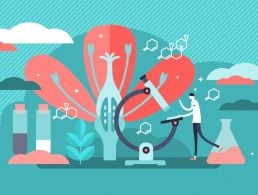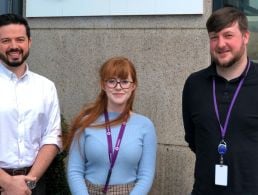The future of work will definitely include artificial intelligence in some shape or form. But what will our actual workplace look like?
Artificial intelligence (AI) has definitely arrived and it’s here to stay, especially in the workforce. The topic of technology was heavily discussed at the World Economic Forum in Davos this year.
While several experts and thought leaders discussed the notion of robots taking our jobs, most agreed that AI will certainly change the future of work, and some jobs will disappear, but many more will be created.
Lifelong learning
“Technology is not the only disrupter,” said Brett Walsh, Deloitte’s global human capital leader. “Another disrupter is the shortening in the half-life of skills.”
In conversation with Matthew Bishop, senior editor at The Economist, lifelong learning was a major talking point for the future of work.
“Lifetime learning is certainly something that we have to get used to,” said Walsh.
With AI becoming a definite part of the workforce, jobs, roles and careers will change and so, employees will have to adapt to constant learning and upskilling.
According to Bishop, our educational system isn’t yet equipped for lifelong learning, which means it’s up to the current working world to adapt.
Accenture released a report on the future of work, which highlights solutions and plans that should be put in place to upskill and reskill employees.
Its research shows a shortage of technology experience in boardrooms. In a survey of more than 10,000 employees in 10 countries, only 10pc of board members surveyed report having professional technology experience.
The survey also showed that 95pc of people believe they need new skills to stay relevant at work. Luckily, some companies are already putting upskilling plans to action.
Telecommunications company AT&T aims to reskill 140,000 staffers for new roles by 2020, with the expectation that they’ll change roles every four years. In one four-month period, employees who had undertaken retraining filled half of all technology management roles at the company.
Companies joining forces to tackle the skills issue was also an encouraged solution. For example, India’s engineering industry group NASSCOM is helping the public sector to create new courses on data science and analytics, automation and internet of things in academics.
An unhappy workforce?
Employee engagement is another major issue facing the future of work. “In bigger companies, you’re consistently seeing two levels of tremendous employee dissatisfaction,” said Bishop.
Talking to Walsh, Bishop said consistent results show that only between 10pc and 20pc of employees are genuinely happy and most of the rest are either not engaged or actively unhappy.
The workplace dynamic hasn’t changed much in the past. With new technology, a whole new generation dominating the workforce, and a different attitude to how work can or should be done, the time has come for change in order to keep employees engaged.
The work-life balance has never been more important. Flexibility, upskilling and career progression are becoming more important than they ever were before, although salaries are still relevant to avoid a move to a low-wage world.
‘We’re all used to eight hours of work a day, or 40 hours of work a week, but do we really need to do that?’
– C VIJAYAKUMAR
Work is no longer about hours worked equals money in the bank. Accenture’s worker values index shows that engagement, quality of life and status are equally, if not more, important to workers than income and benefits.
Flexibility is key to a happier workforce in the future. At a panel discussion about the future of work, C Vijayakumar, CEO of HCL Technologies, questioned the conventional thinking of standardised work days.
“Generally, we’re all used to a life where you spend 15 or 20 years in education, and another 30 or 40 years of work and then retirement. I think this needs to be replaced by lifelong learning and lifelong work.”
He continued: “We’re all used to eight hours of work a day, or 40 hours of work a week, but do we really need to do that?”
What will the workplace look like?
Another factor is the generational change, which is not only affecting employment engagement, but also how work will be done and how companies will operate.
Currently, 50pc of the workforce are millennials. By 2030, that is expected to be 75pc. There’s no doubt that this will affect the future of work.
According to Walsh, there will be many changes in the workplace with “organisation design and restructuring being one of the highest”.
He predicts companies will move to a more agile ‘soft structure’, one that will be more focused on relationship networks, groups and teams.
Companies such as Uber, Google and other cloud platforms are already moving in that direction. When it comes to making changes like this, Accenture’s report suggests that a slow continuous roll-out is more effective than lengthy pilot programmes.
“Rapid experimentation trumps designing and piloting. Instead of trying to get the entire organisation to move to new practices, test them ‘on the fringes’ and keep them away from the institutional culture whose immune system will squash them.”
‘Women need a seat at the table’
– PHILIP JENNINGS, UNI GLOBAL UNION
The future of work also needs more diversity to stay promising and sustainable.
In a panel discussion in Davos, Joi Ito, director of MIT Media Labs, warned that many AI engineers generally come from similar backgrounds.
In AI programming, systems will be designed in a way their trainers see the world, which will have huge gaps in knowledge without diversity.
In a separate debate, UNI Global Union’s general secretary, Philip Jennings, talked about the importance of feminism in the future of work. “Women need a seat at the table.
“We now have quotas for women in every single decision-making body within our global union and it has worked.”
Looking for jobs in tech or science? Check out our Employer Profiles for information on companies hiring right now and sign up for our Career Republic e-zine for a weekly digest of sci-tech careers news and advice.




